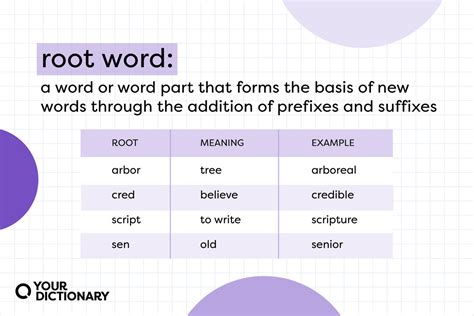The vast and fascinating world of words. Language is a powerful tool that allows us to express ourselves, communicate with others, and convey complex ideas. At the heart of every word lies a root, a fundamental element that provides the foundation for meaning. One such root is "syn," which is derived from the Greek word "syn-" meaning "together" or "with." In this article, we will explore 10 examples of words that use the "syn" root, and discover how understanding this root can help boost your vocabulary.
Unlocking the Power of "Syn"

The "syn" root is a versatile element that can be found in a wide range of words across various disciplines. From science and technology to philosophy and everyday conversation, "syn" plays a crucial role in forming words that convey the idea of togetherness, union, or combination.
Example 1: Synchronize
The word "synchronize" means to coordinate or time two or more things to happen simultaneously. For instance, "The team synchronized their efforts to complete the project on time." By understanding the "syn" root, you can break down this word into its constituent parts: "syn-" (together) and "-chronize" (time).

Example 2: Synthesis
In chemistry, "synthesis" refers to the process of combining two or more substances to form a new compound. For example, "The scientist performed a synthesis of the elements to create a new material." Here, the "syn" root is combined with the suffix "-thesis," meaning "putting together."

Example 3: Synonym
A "synonym" is a word that has the same or nearly the same meaning as another word. For instance, "Big" and "large" are synonyms. The "syn" root is combined with the suffix "-onym," meaning "name" or "word."

Example 4: Synopsis
A "synopsis" is a brief summary or overview of a larger work, such as a book or movie. For example, "The synopsis of the novel provided a glimpse into the main characters' motivations." The "syn" root is combined with the suffix "-opsis," meaning "view" or "sight."

Example 5: Synergy
"Synergy" refers to the interaction or cooperation of two or more agents, systems, or organizations that produces an effect that is greater than the sum of their individual contributions. For instance, "The team's synergy led to a successful project outcome." The "syn" root is combined with the suffix "-ergy," meaning "work" or "activity."

Example 6: Synod
A "synod" is a council or assembly of church officials or clergy that meets to discuss and decide on matters of doctrine or church governance. For example, "The synod voted to approve the new policy." The "syn" root is combined with the suffix "-od," meaning "way" or "journey."

Example 7: Synthesis Reaction
In chemistry, a "synthesis reaction" is a type of reaction in which two or more substances combine to form a new compound. For instance, "The synthesis reaction produced a new material with unique properties." The "syn" root is combined with the suffix "-thesis," meaning "putting together."

Example 8: Synergistic
"Synergistic" refers to the interaction or cooperation of two or more agents, systems, or organizations that produces an effect that is greater than the sum of their individual contributions. For example, "The team's synergistic approach led to a successful project outcome." The "syn" root is combined with the suffix "-ergic," meaning "work" or "activity."

Example 9: Syncretism
"Syncretism" is the practice of combining different cultural, philosophical, or religious traditions to form a new system or worldview. For instance, "The syncretism of the two cultures resulted in a unique blend of traditions." The "syn" root is combined with the suffix "-cretism," meaning "mixing" or "blending."

Example 10: Syndicate
A "syndicate" is a group of individuals or organizations that work together to achieve a common goal or interest. For example, "The syndicate invested in the new business venture." The "syn" root is combined with the suffix "-dicate," meaning "together" or "united."






Conclusion
In conclusion, understanding the "syn" root word can help you decipher the meaning of a wide range of words across various disciplines. From science and technology to philosophy and everyday conversation, the "syn" root plays a crucial role in forming words that convey the idea of togetherness, union, or combination. By recognizing this root, you can expand your vocabulary and improve your comprehension of complex concepts.
We hope this article has provided you with a deeper understanding of the "syn" root word and its many applications. Whether you're a student, a professional, or simply a curious learner, we encourage you to continue exploring the fascinating world of words and their meanings.
What is the meaning of the "syn" root word?
+The "syn" root word means "together" or "with."
How is the "syn" root word used in science and technology?
+The "syn" root word is used in science and technology to form words that convey the idea of togetherness or combination, such as "synthesis" and "synergy."
Can the "syn" root word be used in everyday conversation?
+Yes, the "syn" root word can be used in everyday conversation to form words that convey the idea of togetherness or cooperation, such as "synergistic" and "syncretism."
